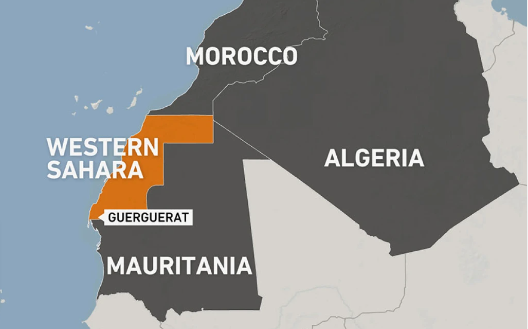Abuja, our nation’s capital, has this week been hosting an International Conference on Western Sahara. Titled “Towards the Liberation of Africa’s last Colony”, the conference brought progressive intellectuals, students and leaders of the Nigerian working class movement together with delegates from around the world. The African Union was there and for the first time in a long time, the world converged in Abuja for a very worthy cause in support of African liberation.
The struggle of the people of Western Sahara, officially known as Saharawi Arab Democratic Republic, SADR, is the last issue on the African Agenda of anti-colonial independence. It is a shame and a blot on the humanity of all of us, that the people of that phosphate and fisheries rich country have remained colonised, not by the Spanish, that were the original colonizers, but another African country, Morocco.
Morocco’s intransigent refusal to withdraw from its illegal annexation of Western Sahara, backed by the imperialist powers and reactionary Arab countries such as Saudi Arabia, has prolonged the suffering of the heroic Saharawi people, who have refused to accept annexation as the end of their long struggle for independence, which had a fierce armed phase, that was suspended, in pursuit of a peaceful route towards decolonisation.
This week’s international conference has come at a most poignant moment in Nigeria’s own history and it possesses a remarkably symbolic element that we must not lose sight of. It was during his first coming as Nigeria’s military Head of State, that General Buhari recognised the Saharawi Arab Democratic Republic, SADR.
Nigeria’s proactive recognition of the Saharawi struggle as basically a decolonisation issue, helped to ginger African support for SADR and the country was admitted into the Organisation of African Unity, OAU and its successor body, the African Union, AU. Nigeria’s Foreign Minister at the time, who spearheaded the recognition of SADR, was Professor Ibrahim Gambari, who would go on to post a very distinguished international diplomatic career in the United Nations system. It was Professor Gambari that delivered the keynote address at this week’s international conference.
The fact that the conference has held and has been so well attended, reflects the new dawn in Nigeria and the possibility that Nigerian Foreign Policy might be coming back to its old tradition of support for progressive human endeavours, but especially a more activist leadership for issues that affect the African continent and its peoples. Under the Jonathan administration, Nigerian Foreign Policy, if it ever really existed, had departed from its traditions of independence and support for anti-imperialist struggles. Goodluck Jonathan opposed the African consensus, by supporting the imperialists’ (USA, Britain and France) bombing of Libya in 2011, much to the chagrin of other African countries.
Blinded by his servile groveling surrender to imperialist diktat, Jonathan could not see the interconnectedness between the opening of the road to hell, which the Libyan invasion represented and the proliferation of sophisticated arms in West Africa, including inside Nigeria with the sophistication that the Boko Haram insurgency assumed after Ghadaffi was overthrown in Libya.
The same man would bow to the diktat of the Zionist state of Israel, when a mere telephone call from the utterly reactionary Israeli Prime Minister, Benjamin Netanyahu, led Jonathan to betray the Palestinian people in a vote at the United Nations.
Progressive humanity has converged in Abuja this week to remind us all that for as long as a part of the African continent is occupied, then no African country or the individual African for that matter, can claim to be free. We worked collectively to end the intransigence of apartheid and imperialism in Southern Africa, and one after the other, colonies like Mozambique, Angola, Guinea Bissau, Zimbabwe and Namibia gained independence. Similarly, the African and international resolve terminated apartheid.
The only part of our continent remaining under colonisation is Western Sahara(SADR). The new turn in Nigerian life has provided a progressive backdrop for Africans to work in a determined manner to ensure that we collectively help to ensure the complete decolonisation of the Saharawi Arab Democratic Republic. In 2009, I travelled in the camps of Southern Algeria as well as the liberated areas of Sahara to get a first hand account of the position of the Saharawi people.
What I took away from that trip was the sacredness of hope that liberation will eventually come to its people as well as the anger of the youth of Sahara, that the world is not pressurizing the Moroccans as much as they should, to end the incongruity of an African country becoming the colonizer of another African people. We must therefore assist the process that will end this blot on our collective conscience.
This week in Abuja, Nigerian students, progressive intellectuals and working people picketed the Moroccan Embassy, as part of actions in support of decolonisation of Western Sahara. It will be noted around the world, that Africans have not abandoned the Saharawi people!.


